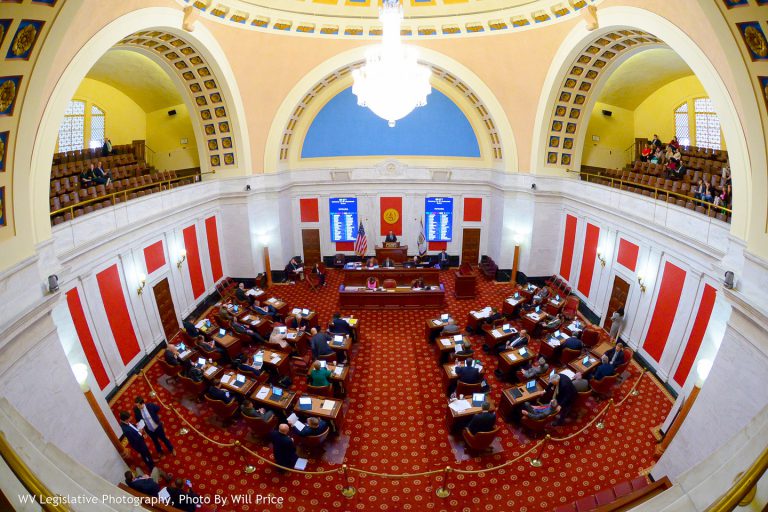As of 4 p.m., on Wednesday, January 26th, 2011, the 15th day of the 80th Legislature’s 1st Regular Session, 879 bills have been introduced. Of those, 10 passed and have been sent to the Senate for further consideration. The bills passed by the House this week were:
House Bill 2075 would update the Code by removing an outdated reference to state licensure tax on businesses and its required use by municipalities. The bill would allow the governing body of a municipality to execute an ordinance to continue the municipal licensure of businesses.
House Bill 2345 would change the membership of the PEIA Board by changing the number of citizen members from four to three.
House Bill 2370 would remove the Commissioner for the Bureau for Public Health from professional licensure boards.
House Bill 2402 would redefine the term “public record” as any writing containing information prepared or received by a public body and relates to the conduct of the public’s business, just as the term is used in the Freedom of Information Act. The bill would expand the documents subject to public release to include documents that relate to the public’s business.
House Bill 2438 would clarify old contradicting language still remaining in the Code and would reestablish a definition for “independent voter” as the presently cited definition is no longer in the Code.
House Bill 2475 would include certain records of the Division of Juvenile Services in the exemptions from Freedom of Information Act requests. Those records would include documents relating to the design of corrections, jail or detention facilities and the policy and operational procedures of personnel relating to the safe and secure management of inmates or residents, that if released, could be used by an inmate or resident to escape a facility or cause injury to another inmate, resident or facility personnel.
House Bill 2521 would provide for immediate publication of a domestic violence incident instead of requesting service by mail in domestic violence cases.
House Bill 2556 would reset the expiration date until 2014, for provisions that allow the employment of retired teachers as substitutes beyond the post-retirement employment limit in areas of critical need and shortage.
A Sampling of Bills Introduced In the House
House Bill 2534 would establish a program to promote veteran friendly communities in order to assist and encourage the development, availability and utilization of veteran friendly services, benefits and assistance available to veterans.
House Bill 2693 would require insurance coverage for autism spectrum disorders and ensure any limitation to coverage does not conflict with the Patient Protection and Affordable Care Act.
House Bill 2714 would create the West Virginia Addictions Treatment and Recovery Fund, monies would come from five cents per ounce of the uniform price of alcoholic liquors sold in this state.
House Bill 2768 would provide a personal income tax exemption for living organ donors. This bill would allow a person who, while living, donates one or more human organ to another human being for transplantation is exempt from all personal income tax in the taxable year in which the transplant occurs. A “human organ” means all or part of a liver, pancreas, kidney, intestine, lung or bone marrow.
House Bill 2794 would require that when a controlled substance is dispensed by mail or delivery service, the person accepting the delivery of the controlled substance must be 18 years of age or older, present government issued identification and must sign a receipt indicating acceptance of the controlled substance.
House Bill 2800 would create the West Virginia Ski Resort Industry Commission to encourage and foster continued development of the state’s ski resort industry.






 Standing committees are the most common and have specific areas of concern. These committees are permanently created because of the constant changing aspects of the issues related to those concerns. Examples of standing committees within the Legislature would be the Senate Judiciary Committee and the House Finance Committee.
Standing committees are the most common and have specific areas of concern. These committees are permanently created because of the constant changing aspects of the issues related to those concerns. Examples of standing committees within the Legislature would be the Senate Judiciary Committee and the House Finance Committee. Today marked the 8th annual Undergraduate Research Day at the Capitol. Young research talent from across the state filled the Rotunda, showcasing posters on research in areas ranging from the impact of blue green algae on muscular endurance and resolving emotional pain and trauma, to video game performance and Internet aggression.
Today marked the 8th annual Undergraduate Research Day at the Capitol. Young research talent from across the state filled the Rotunda, showcasing posters on research in areas ranging from the impact of blue green algae on muscular endurance and resolving emotional pain and trauma, to video game performance and Internet aggression. The House recognized today, January 25, 2011 as Girl Scouts Day in the Legislature. In a brief morning session, the House introduced 17 bills and passed three.
The House recognized today, January 25, 2011 as Girl Scouts Day in the Legislature. In a brief morning session, the House introduced 17 bills and passed three. What better way to usher in the passage of a bill, than a brand new gavel? Acting Senate President Jeffrey Kessler used his new gavel, made by Joint Committee staff Dennis Loudermilk, to bring the session to order. Along with this new gavel, eight bills were introduced and three resolutions were adopted.
What better way to usher in the passage of a bill, than a brand new gavel? Acting Senate President Jeffrey Kessler used his new gavel, made by Joint Committee staff Dennis Loudermilk, to bring the session to order. Along with this new gavel, eight bills were introduced and three resolutions were adopted. The House introduced 79 bills and passed one in a brief late morning session. Also, four bills were read for the first time and sent to their respective committees.
The House introduced 79 bills and passed one in a brief late morning session. Also, four bills were read for the first time and sent to their respective committees. Today in the Senate 11 bills were introduced and one resolution was adopted.
Today in the Senate 11 bills were introduced and one resolution was adopted.